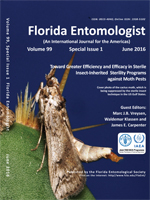The sterile insect technique (SIT) is as an important component to the area-wide integrated management of the false codling moth, Thaumatotibia leucotreta (Meyrick) (Lepidoptera: Tortricidae), which was successfully implemented in the Western Cape region of South Africa and subsequently expanded to citrus areas in the Eastern Cape region of South Africa. This integrated control program, which transports sterile moths from a rearing facility in Citrusdal, South Africa to orchards in both the Western and Eastern Cape, must continuously examine production, handling, processing, transport, and release protocols to ensure the delivery of high-quality sterile moths. While the use of cold temperature to immobilize moths is standard protocol for SIT programs to increase the density of moths for purposes of collecting, handling, irradiation, transport and release, some concern has been raised that rapid chilling and long cold temperature storage of moths may negatively impact field performance of some insectary-reared insects. We conducted trials to examine the effect of irradiation with 150 Gy of gamma rays and cold temperature storage on the performance of T. leucotreta moths released in citrus orchards. The radiation treatment did not significantly affect the performance of T. leucotreta moths released in citrus orchards. However, compared with moths held at room temperature, moths that were rapidly chilled were less likely to be captured in pheromone traps and less likely to disperse as great distances following release in citrus orchards. Additional research is needed to identify an alternative to rapid chilling and cold temperature storage that does not impair mating competitiveness and dispersal of irradiated T. Leucotreta adults. Procedural changes that will maintain or enhance sterile T. leucotreta moth quality and performance in the field, while allowing for the cost-effective handling and processing of the sterile moths, need to be considered.
How to translate text using browser tools
1 June 2016
Influence of Holding Temperature and Irradiation on Field Performance of Mass-Reared Thaumatotibia leucotreta (Lepidoptera: Tortricidae)
Nevill Boersma,
James E. Carpenter

Florida Entomologist
Vol. 99 • No. sp1
Jun 2016
Vol. 99 • No. sp1
Jun 2016
chilling
Competitiveness
competitividad
control de calidad
enfriamiento
false codling moth
handling




